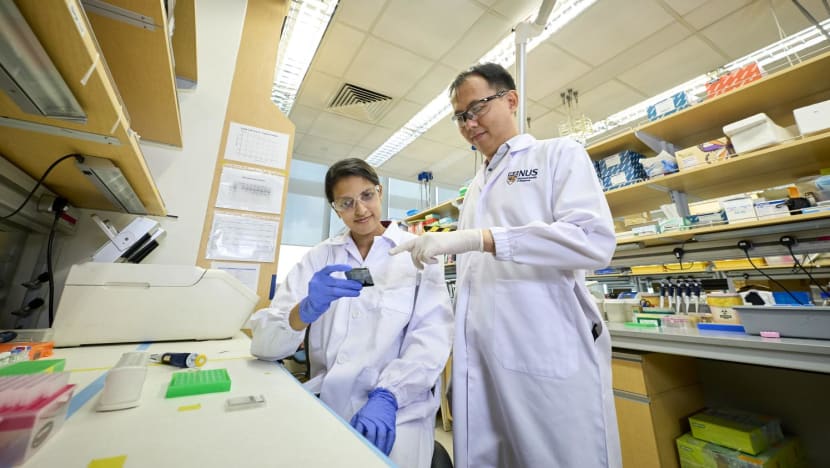Regular cancer testing could become a reality with a new method developed by NUS researchers
The method, which requires just a blood sample, costs about S$50 from start to finish, compared to other tests that can cost up to S$1,000.

Assistant Professor Cheow Lih Feng (right), his former PhD student Dr Elsie Cheruba and their team at the National University of Singapore have developed an affordable and highly sensitive blood test for cancer. (Photo: NUS Institute for Health Innovation & Technology)
SINGAPORE: An accidental discovery by researchers from the National University of Singapore (NUS) has led to the development of a novel low-cost method of testing for cancer.
During an unrelated experiment, they found that heating up a sample allowed them to detect the presence of cancers while eliminating genome information that is not useful.
The method, which requires just a blood sample, costs about S$50 from start to finish, compared to other tests that can cost up to S$1,000 to conduct.
Called the Heatrich-BS assay, this new method opens the possibility of regular testing.
“When you have a S$50 test, it opens up a lot of avenues because it is affordable, so you can do the test quite regularly,” said Assistant Professor Cheow Lih Feng, who led the research team.
Speaking to CNA’s Singapore Tonight on Tuesday (Dec 6), Asst Prof Cheow, who is the principal investigator at the NUS Institute for Health Innovation & Technology, said that many of the current tests for cancer look at just a few genes.
“Cancer is a very heterogeneous disease. If you look at just a few genes, you're bound to miss out on some patients who actually have cancer,” he said.
On the other hand, whole-genome sequencing attempts to sift through all the genetic material, making it expensive, he added.
TRIALLING THE TEST
The test developed by the team strikes a balance between breadth and depth, he noted.
“We are able to look at hundreds and thousands of genes simultaneously, but still maintain a low cost thanks to the ability of this heating to eliminate a vast majority of the non-informative DNA sequences,” he said.
“A comprehensive, yet low cost, cancer detection in a non-invasive manner is what is not available in the market right now.”
The team comprises researchers from the NUS Department of Biomedical Engineering under the College of Design and Engineering, as well as the NUS Institute for Health Innovation & Technology.
The test has been trialled among colorectal cancer patients at the National Cancer Centre Singapore, Asst Prof Cheow said.
“We are actually using these tests to test cancer patients who are undergoing treatment and we check the tumour load in their blood to see if they're responding,” he said, adding that the early detection of recurrence is also being tested.
APPLYING METHOD TO OTHER CANCERS
He added that the team is confident in applying the concept to other cancers as well.
“We find that the enrichment of these cancer-specific modifications at this heat-resistant DNA is actually universal across different cancers,” he said.
He added that given that the test has “very good” sensitivity and specificity and is affordable as well, more people may be encouraged to do regular cancer screening.
“It is a simple blood draw. So, I think it is actually (a) very good fit into these regular annual checks,” he said.
In its statement, NUS also said that the test may help accelerate future academic research, paving the way for scientists to study different subtypes of cancer at a lower cost, therefore improving the development of future cancer diagnoses and therapies.
The NUS team published their findings in the scientific journal Science Advances on Sep 9 this year, and a patent has also been filed for their discovery.
Asst Prof Cheow and his team are now exploring ways to commercialise their assay by partnering with pharmaceutical and biotechnology companies that can help bring the Heatrich-BS assay to market.
“We actually got some interest from companies who are interested in taking this technology and offering it to patients and hopefully it will come out in one to two years’ time,” he said.
















